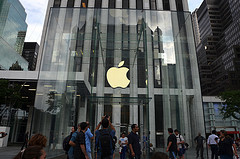DOJ: Steve Jobs E-Mails Show That Apple Engaged In E-Book Price-Fixing

(afagen)
The price-fixing allegations claim that Apple colluded with the nation’s largest book publishers to shift from an e-book pricing model that was similar to how physical books are sold — retailers pay a negotiated wholesale price then sell the title at whatever price they want — to a so-called “agency model,” in which the publisher sets the retail price and the seller gets a set percentage of that price.
It’s been alleged that Apple brought this idea to the publishers in the hope of leveling the playing field against e-book industry leader Amazon. Apple was about to launch the iPad, and if it was charging the exact same rate as Amazon and every other e-book seller, there would be no reason for iPad and iPhone users to buy elsewhere when they could easily get the title through the iTunes store.
Prior to agency pricing, Amazon had routinely been charging $9.99 for an e-book title, but when the publishers were able to set the prices, they often increased. In a number of cases, the e-book price on Amazon was more expensive than the comparable paperback. This pricing disparity was only compounded in books that were sold as a set. For example, the paperbacks of the first four books in George R.R. Martin’s wildly popular A Song of Ice and Fire series can be purchased from Amazon in a set for under $20, while the e-book price for the same books is $29.99. Before public outcry, it had been even higher — $39.96 — because Amazon was forced to charge the full e-book price for each title.
Both the publishers and Apple have denied any collusion, but a newly uncovered e-mail from late Apple co-founder and turtlenecked figurehead Steve Jobs to James Murdoch of News Corp (parent company of HarperCollins, one of the sued publishers and a former employer of yours truly) seems to indicate that its Jobs who came up with the pricing scheme.
“Throw in with Apple and see if we can all make a go of this to create a real mainstream e-books market at $12.99 and $14.99,” wrote Jobs.
Two days later, HarperCollins signed a deal with Apple that made agency pricing its standard model for all e-book sellers.
The DOJ also alleges that when Random House resisted the shift to the agency model, Jobs threatened to block the publisher’s e-book application from being distributed through the Apple app store. After Random House gave in, the Apple exec in charge of its e-books deals wrote to Jobs saying that part of the reason the publisher ultimately agreed was “the fact that I prevented an app from Random House from going live in the app store.”
Another document uncovered by the DOJ shows Random House’s top executive saying his company had been counseled by Apple to withhold e-books from Amazon in order to get the company to accept agency pricing.
A rep for Apple defends the company’s involvement in the e-book business.
“We helped transform the e-book market with the introduction of the iBookstore in 2010, bringing consumers an expanded selection of e-books and delivering innovative new features,” the rep tells the NY Times. “The market has been thriving and innovating since Apple’s entry, and we look forward to going to trial to defend ourselves and move forward.”
U.S. Now Paints Apple as ‘Ringmaster’ in Its Lawsuit on E-Book Price-Fixing
Want more consumer news? Visit our parent organization, Consumer Reports, for the latest on scams, recalls, and other consumer issues.

